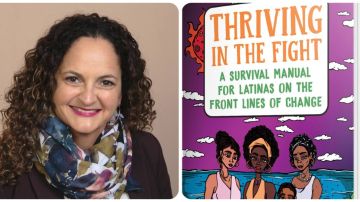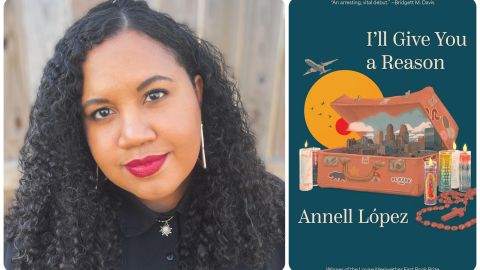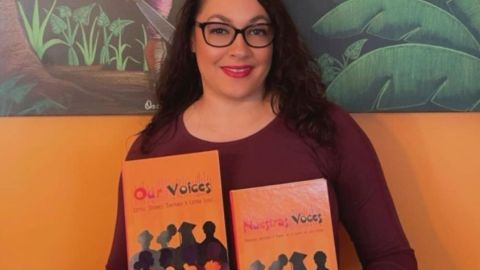Denise Padín Collazo’s New Book Addresses How Latinas Can Handle Burnout in Activism
Latinas, who are already challenged by systemic racism, experienced devastating economic loss during the pandemic with unemployment among Latinas reaching as high as 20 percent in April of 2020 according to a recent report by UnidosUS

Photo courtesy of Denise P. Collazo
Latinas, who are already challenged by systemic racism, experienced devastating economic loss during the pandemic with unemployment among Latinas reaching as high as 20 percent in April of 2020 according to a recent report by UnidosUS. As the report finds, “Latinas have confronted a triple crisis in the face of COVID-19: disproportionately higher infection rates, economic losses, and family-work conflict.”
And who are the leaders on the front line working to advocate for Latinas? More often than not, it is women of color, including Latinas, who overrepresent in the social change sector. It is these Latinas that author Denise Padín Collazo had in mind in when writing her book Thriving in the Fight: A Survival Manual for Latinas on the Front Lines of Change released earlier this year (the Spanish version will be out October 4). Collazo is currently senior advisor for external affairs for Faith in Action, a non-partisan faith-based non-profit fighting racial injustice.
Q: Can you share a few words of wisdom for new organizers?#InternationalWomensDay #FaithinAction pic.twitter.com/dCMng42qDO
— Faith in Action (@FIAnational) March 8, 2021
Collazo, who is a nationally recognized social justice leader with roots in community organizing, pours her decades of experience into an accessible guide for Latinas that might be experiencing burnout as they lead the important work of social change. Complete with worksheets with prompt questions and well-researched, Thriving in the Fight is a timely resource for Latinas who are direct service providers, nonprofit leaders, or in the public sector. Through real-life examples from Collazo’s own journey on the front lines of social change, the book provides a blueprint for Latinas to self-advocate and lead at work.
The book is also an inspiring tool for organizational leaders that want to build back better places to work that can retain and support Latinas who often have to make difficult decisions about managing family and work. Latinas had to make especially difficult choices during the recent health crisis. During the pandemic, 14 percent of Latinas had to reduce their hours or quit their jobs due to child care needs.
Collazo, who calls herself a “Family Work Integrator” in her LinkedIn bio, dedicates a chapter of her book to integrating family and work, commonly known as “work-life balance.” The framing of family-work integration is intentional and it is a framing Collazo learned from her mentor, Dr. Stacy Blake-Beard who jokingly told her “the only time you’re balanced is when you’re dead.”
“I call it family-work integration because as Latinas, family is first,” Collazo tells HipLatina. “We were doing [family-work integration] all along and the pandemic highlighted how we do it.” She observed that with zoom calls replacing in-person meetings, organizations were exposed to the ways that women already do the double work of leading at work and managing their households, with computer screens providing a window into the everyday responsibilities women often hold.
Happy Publication Day, Denise Collazo! Social justice work is more crucial than ever, but it can be physically and emotionally draining. We're so happy you're showing leaders how they can thrive in the fight. pic.twitter.com/SFdCPgZYjD
— Berrett-Koehler Publishers (@BKpub) February 23, 2021
One of the questions Collazo confronts in her book is how Latinas can bring the care they invest in others into an investment in themselves. “[Latinas] are amazing, we are brilliant, we are badass, we are bold. How do we take time to care of ‘Me’? How do we prioritize and create room for the things we want to do, the things that help us thrive?”
Collazo wants to help Latinas create space to do what they love and she sees creating that space as a vital part of the work of social change. For Collazo, it’s important that Latinas make the time to recharge because it helps them show up as their best selves at work and this, in turn, makes them stronger and better agents of change. The notion of self-care is often at odds with a work culture that prioritizes productivity, but for Collazo, self-care is an essential component of productivity.
“We need rest. Our minds need to rest. Our bodies need rest. It sounds so basic, but productivity is really about output over input. If you’re actually able to put in less and produce more, that’s higher productivity. If you rest, if you stop and breath, you are more likely going to show up as a much closer version of the lovely creative person that you are.”
A barrier that gets in the way of Latinas prioritizing self-care or family is a work culture of urgency that Collazo described as a symptom of white supremacy. In her book, Collazo cites Dismantling Racism by Tema Okun who describes five symptoms of white supremacy in institutions: individualism, fear of failure, fear of open conflict, binary thinking, right to comfort (for some).
“In some ways, we’ve been taught to put our heads down and work hard. It is an act of rebellion to stop and say ‘I am going to take care of me so that I can be the biggest, baddest, best version of myself.”
Collazo doesn’t just preach self-care, she makes it a personal and professional priority. When she was chief of staff of Faith in Action, a national organization that fights racial and economic oppression, she instituted a Family Work Integration program where all staff, from those in support roles to executives, were able to use each Friday as a paid day to use for “reflection, rest, and creativity.” It was important for Collazo that the policy be organization-wide. “As a leader, we have to see, say, and do. We can’t just say that people should take care of themselves, we have to model it.”
As the country begins to recover from the economic crisis caused by the pandemic, Collazo sees an opportunity for organizations to rebuild differently and in a way that takes greater consideration of the needs of women and women of color specifically.
“We cannot return to what we had because what we had wasn’t sustainable for most people. We are at a choice point. I have a lot of hope because we are growing our numbers of women of color in leadership and women in leadership more broadly. There’s still way too few of us in leadership, but as we grow in our influence and impact, we can impact our own spheres of influence.”
Collazo hopes her book not only inspires Latinas in the fight for social change at all levels of leadership but that it also speaks to allies and leaders interested in shifting work cultures in ways that encourage Latinas to lead from the front. She notes in the book that she estimates that only “3.6 percent of nonprofit executive directors are women of Hispanic descent.”
Collazo’s book makes the case that more Latinas should be thriving, not just surviving, at work and that they should be stepping into leadership roles. She does this both by encouraging Latinas to lead and by exposing some of the systemic barriers they continue to face.
“Our world needs our brilliance, and too often we are on mute, and that is not what the path of liberation looks like.”

















